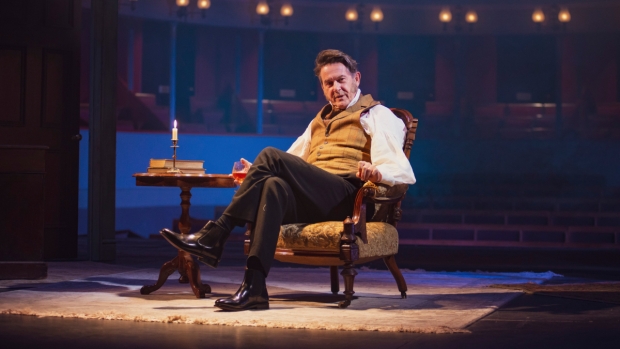Review: Being Mr Wickham (Theatre Royal Bury St Edmunds, online)
The streamed piece is presented by Original Theatre Company

© James Findlay
There's no doubting the real star of Being Mr Wickham: it's the Theatre Royal, Bury St Edmunds, which in Libby Watson's clever design glints in the background of this monologue, bringing the glory of a preserved Regency setting to the story of what happened to George Wickham after Jane Austen's Pride and Prejudice ended.
Wickham, you will remember, is the rogue who marries Lydia in the most disreputable and the most hurried of the novel's weddings; she is saved from ruin by the intervention of Mr Darcy, who forces Wickham, his father's godson, to make an honest woman of her after they have eloped. The events surrounding their match pave the way for the more famous and more reputable one between Elizabeth and Darcy.
Adrian Lukis, who is both co-author (with historian Catherine Curzon) and star of this one-man reminiscence, played Wickham in Andrew Davies's imperishable TV adaptation. His play is an attempt to provide context and to give the character the final word. Since no man is the villain of his own story, the picture that emerges is less critical and more sympathetic than the one Austen offered.
We are reunited with Wickham on his 60th birthday, when he is fretting about the loss of his looks and the vanishing of a world order that seemed more colourful than the "sanctimonious age of Victoria" in which he now finds himself. Lydia's still with him – a querulous voice off- and their children have grown up playing with those of Darcy and Elizabeth. All seems pretty well in Wickham world, though he has suffered – his best friend Denny was shot by his side at the battle of Waterloo – and still rails against a society that rewards wealth and propriety more than charm and his kind of dashing courage.
It's an interesting hour, particularly if you love Pride and Prejudice, gracefully directed with swift changes of pace and mood by Guy Unsworth and streamed courtesy of the Original Theatre Company. Lukis's presence makes it worth your while. He is such a watchable actor – he draws you into complicity with him, while making you hang on his every word. He knows how to wreak maximum advantage from a raised eyebrow, or a small sigh, and the pause he leaves between the phrase "I'm told I'd pass for 40" and its successor "on a good day" speaks volumes about the man.
There's a melancholy thread that runs through these reminiscences – "I've seen it all, though myself unseen" – that rounds out the story of Wickham's life and the context in which it unfurled. The writing is good too; vivid on Waterloo (when Howard Hudson's lighting design turns the walls blood red), funny on Lydia ("When she is asleep, I'm delighted"), sharp on the distinctions of class and rank that defined the Georgian age.
I suspect Lukis and Curzon are rather kinder to Wickham than Austen would have been if she'd survived to write the follow up, but nevertheless this is a classy production in the company of one of literature's footnotes.












